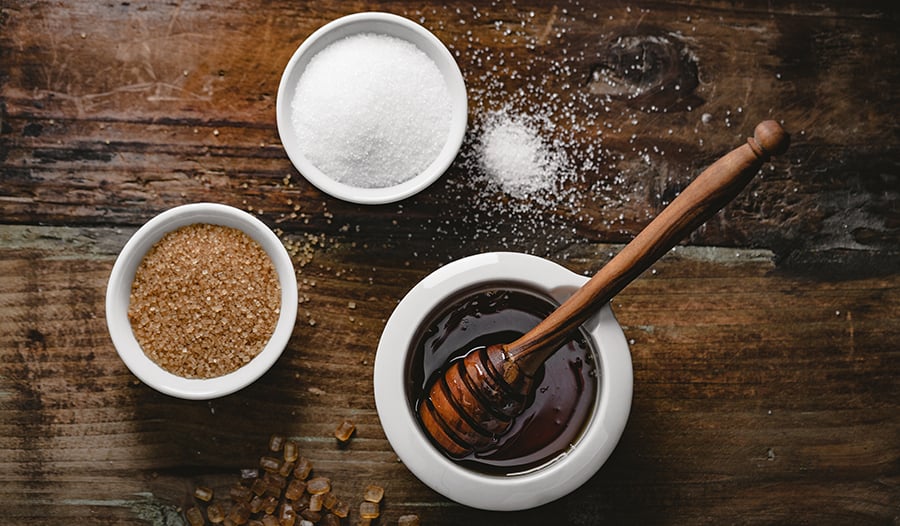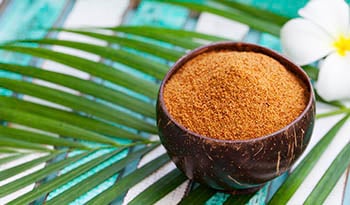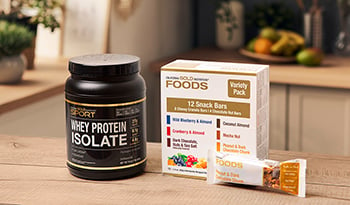7 Natural Sweeteners That Are Not Erythritol
DISCLAIMER:This blog does not intend to provide diagnosis...
- In this article:
- What Is Erythritol Sweetener?
- Is Erythritol Safe?
- Side Effects of Erythritol
- What Are Natural Sweeteners?
- Natural Sweetener Alternatives to Erythritol
- 1. Stevia
- 2. Coconut Sugar
- 3. Monk Fruit
- 4. Maple Syrup
- 5. Agave
- 6. Dates
- 7. Allulose
- Takeaway

Recently, news broke on a study that found erythritol, a sugar alcohol alternative sweetener, may increase the risk of blood clots in veins or arteries and is associated with increased risk of cardiovascular events like heart attack and stroke.1 Seeing headlines with scary titles is concerning for many of us. Often, we’re left wondering if we should avoid the product altogether, use it in moderation, or whether the study is even valid.
In this article, we unpack erythritol—the pros, the cons, and how it works—and offer natural sweetener alternatives you can use instead.
If you have concerns about your heart health, it’s best to speak with your doctor directly. For questions about food and your individual nutrition needs, consider working with a registered dietitian to get the most up-to-date, evidence-based information.
What Is Erythritol Sweetener?
With all the controversy surrounding erythritol, you may wonder exactly what it is. You’ve likely seen it on a food label here and there since it became widely used as an alternative sweetener in the late 80s and early 90s.
Erythritol is commonly found in calorie-reduced products like baked goods and candy. Since products with alternative sweeteners like erythritol are lower in sugar, they are often marketed to people with diabetes who may already be at higher risk for heart-related issues.
Erythritol is a sugar alcohol. It is a non-nutritive sweetener that provides little to no caloric value when consumed. Erythritol provides only about 5% of the calories found in regular table sugar:
- Table sugar: 4 calories per gram
- Erythritol: 0.24 calories per gram
Other sugar alcohols that fall into this category include:
- Xylitol: most commonly found in sugar-free chewing gums, candies, mints, and oral care products like toothpaste and mouthwash
- Sorbitol: most often found in sugar-free and reduced-sugar items like chewing gums and mints
- Maltitol: most commonly found in baking mixes and also a sweetener in over-the-counter pharmaceutical products like antacids
An easy way to identify a product that might be a sugar alcohol is to look for “-tol” at the end of its name. On the ingredient lists of nutrition labels, most products that end in “-tol” are sugar alcohols.
Unlike artificial sweeteners like aspartame and saccharin, sugar alcohols are not sweeter than sugar—they offer only about 60 to 70 times the sweetness of table sugar or sucrose.
Is Erythritol Safe?
A recent study found that erythritol can increase blood clot formation.1,2 Having more blood clots can put people with pre-existing heart conditions and heart health concerns at greater risk of heart attack or stroke.
Erythritol is not inherently dangerous and may not pose the same health risks for people who do not have a pre-existing heart condition or increased risk of heart disease. Some foods naturally contain erythritol, like watermelon, grapes, pears, and mushrooms. Avoiding these foods for their erythritol content is unnecessary unless you have an allergy.
The main issue with erythritol is that people tend to consume large amounts when using it as a sugar substitute. The National Institute of Health found that when erythritol is used as a sweetener, the levels are more than 1,000-fold greater than naturally found in foods.2
Side Effects of Erythritol
Most sugar alcohols, excluding erythritol, can affect gut health. Since the body doesn’t digest most sugar alcohols, they are fermented in the colon, which can lead to gas and bloating.
Erythritol, unlike other sugar alcohols, is absorbed into the bloodstream before it reaches the colon. After being absorbed, it is present in the bloodstream and is excreted unchanged in the urine.3
What Are Natural Sweeteners?
Natural sweeteners add sweetness to foods and beverages and are derived from natural sources rather than artificial ones. These are often used as alternatives to refined sugar or artificial sweeteners.
Refined sugar is also known as white or table sugar. It is a highly processed sugar derived from sugar cane or sugar beets. It undergoes several processes to remove impurities and color, producing sucrose.
Artificial sweeteners are non-nutritive, synthetic sugar alternatives that sweeten beverages without adding a significant amount of calories or carbohydrates.
Though the word “natural” isn’t regulated when referring to natural sweeteners, natural sweeteners are less processed and come from sources that occur in nature instead of in a lab. Natural sweeteners may be useful alternatives to erythritol.
Natural Sweetener Alternatives to Erythritol
While more research on erythritol’s safety for the general public is needed, certain groups of people—including those with a pre-existing heart condition or increased risk of heart disease—should avoid consuming erythritol. When looking for alternatives to erythritol, read all nutritional ingredient lists to ensure no erythritol is hiding in the product. Many products use multiple sweeteners, and erythritol is often found in combination with other sweeteners when in packaged goods.
Below are my favorite natural alternatives to erythritol—some of which you might already love and new ones you may want to try.
1. Stevia
Stevia is extracted from the leaves of the Stevia rebaudiana plant. It is sweet and contains very few calories. Stevia is commonly used as a sweetener in baking, coffee, and tea. It has many uses and is one of the most widely used alternative sweeteners.
Many products include other sweeteners, like cane sugar or erythritol, while adding a small amount of stevia to make the product sweeter. In these cases, stevia is listed as one of the last items on the ingredient list.
2. Coconut Sugar
Coconut sugar is produced from the sap of the coconut palm tree. It has a caramel-like flavor and is considered a better alternative to refined sugar because it isn’t processed. Coconut sugar is used in various recipes and can be substituted for granulated sugar in a 1:1 ratio.
While unrefined sugar, like coconut sugar, may be viewed as a more healthful option, remember that sugar is still added sugar and should be consumed in moderation.
3. Monk Fruit
Monk fruit extract is derived from the monk fruit and is used as a natural sweetener. It is significantly sweeter than sugar—an estimated 100 to 250 times sweeter—while providing zero calories.
Due to its high sweetness intensity, you only need a small amount to achieve the desired sweetness in food and beverages.
One of the pros of monk fruit extract is that many people report it does not have a bitter aftertaste commonly associated with other sweetener options. Often, erythritol is added to monk fruit, so make sure you check the ingredients list.
4. Maple Syrup
Maple syrup is made by collecting sap from maple trees and boiling it to concentrate. It has a distinctive rich flavor and is most well-known as a topping for pancakes and waffles. But maple syrup’s uses go far beyond breakfast, and many products contain this natural sweetener.
5. Agave
Agave nectar is derived from the sap of the agave plant, which grows widely in Mexico and the southwest. It is sweeter than sugar and is often used as a sweetener in syrup form or found in baked goods along with other sweeteners. Note that agave nectar is relatively high in fructose and should be consumed in moderation.
6. Dates
Dates can be used as sweeteners in paste, whole fruit, and syrup forms. Date syrup, sometimes called date molasses or date honey, is a thick, sweet syrup made from dates. It has a distinct flavor that is rich, caramel-like, and slightly fruity.
Dates are excellent for sweetening baked goods, desserts, smoothies, dressings, and marinades. Like maple syrup, dates can also be used as a topping for pancakes and waffles.
7. Allulose
Allulose is a low-calorie sweetener that is gaining popularity as a sugar substitute. It occurs naturally in small quantities in certain fruits, such as jackfruit, figs, and raisins. However, it can also be produced commercially.
Takeaway
Many erythritol-free natural sweetener alternatives are widely available in supermarkets. If you are trying to reduce, limit, or completely avoid erythritol, try my list of natural sweeteners to find your favorite—and know that some work better for certain purposes. Remember, not all of these sweetener alternatives are calorie-free or low in carbohydrates. So, if you are trying to limit your sugar intake, check the ingredients list to know which alternatives are non-nutritive sweeteners and which provide sugar.
References:
- Witkowski, M., Nemet, I., Alamri, H. et al. The artificial sweetener erythritol and cardiovascular event risk. Nat Med 29, 710–718 (2023).
- Erythritol and Cardiovascular Events | NIH. Accessed 7/25/23.
- Mazi TA, Stanhope KL. Erythritol: An In-Depth Discussion of Its Potential to Be a Beneficial Dietary Component. Nutrients. 2023 Jan 1;15(1):204.

 By Rhyan Geiger, RDN
By Rhyan Geiger, RDN


